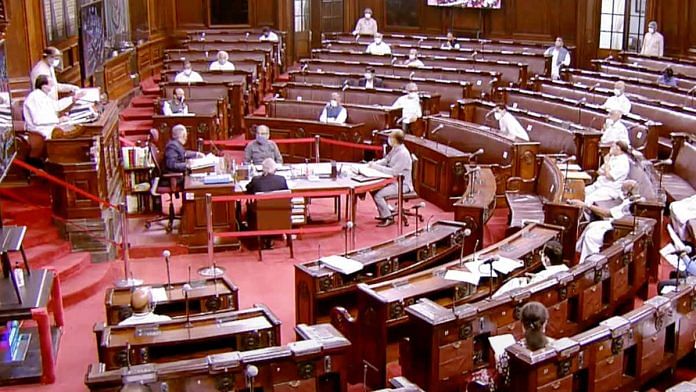New Delhi: Held in the middle of a raging pandemic, the Monsoon Session of the Parliament, which saw the suspension of eight MPs and a boycott by the opposition, was one of the shortest in 20 years but the most productive.
The 18-day session, which started on 14 September, was cut short Wednesday, eight days ahead of schedule, because of a spurt in Covid-19 cases among MPs, Union ministers and Parliament staff.
After Rajya Sabha and the Lok Sabha were adjourned sine die, reports of Junior Railway Minister Suresh Angadi’s death due to Covid-19, at the All India Institute of Medical Sciences in Delhi, also came late Wednesday.
In all, a total of 25 bills were passed in the Lok Sabha and Rajya Sabha respectively, including 11 bills to replace the ordinances promulgated in June. This included the three contentious farm bills and the three labour codes on industrial relations, occupational safety, health and working conditions, and social security, the Foreign Contribution Regulation (Amendment) Bill, the Insolvency and Bankruptcy Code (Second Amendment), Bill, 2020 and the Epidemic Diseases (Amendment) Bill, among others.
Officials at the Lok Sabha Secretariat told ThePrint that it was the shortest among all regular sessions in the last 20 years, with an all-time productivity high of nearly 160 per cent. The productivity in Rajya Sabha during the session was 100.47 per cent.
It was also one of the most tumultuous sessions with eight opposition MPs suspended from the Rajya Sabha for a week for obstructing the House and the opposition, led by Congress, boycotting both the Lok Sabha and Rajya Sabha proceedings in solidarity since Tuesday.
With the opposition absent, the Rajya Sabha cleared a marathon seven bills in under four hours Tuesday.
In a first, the suspended MPs had also held an all night dharna inside the Parliament premises Monday in protest against the farm bills and demanding a revocation of their suspension.
Five days into the session, Union Minister Harsimrat Kaur Badal, who represented the BJP’s oldest ally Shiromani Akali Dal, resigned from Prime Minister Narendra Modi’s cabinet in protest against the farm bills.
In another first, the mandatory Question Hour was also done away with inviting stringent criticism from the opposition.
Despite all the ruckus, the opposition managed to get Defence Minister Rajnath Singh to make a statement in the House on the India-China face off and the situation in the Line of Actual Control in Ladakh. The opposition also cornered the government on the Covid-19 situation in the country, with Health Minister Harsh Vardhan making a statement on measures taken by the government.
Also read: Passage of labour reform bills will ensure workers’ well-being, boost economy, says PM Modi
Lok Sabha sat beyond midnight on two consecutive days
Barring 14 September, the Lok Sabha met between 3 pm and 7 pm while the Rajya Sabha between 9 am and 1 pm. The Lok Sabha, however, extended its working hours beyond 7 pm on all days. On two occasions, on the intervening night of 20-21 September and 21-22 September, it sat beyond midnight to complete its legislative business.
According to data provided by PRS Legislative Research, a non profit organisation that tracks the functioning of the Indian Parliament, for 10 days — between 14 and 23 September — the scheduled time for each House to meet was 40 hours.
As against this, the Lok Sabha met for 57 hours and 16 minutes. It has worked close to 160 per cent of its scheduled time.
The Rajya Sabha, meanwhile, met for 38 hours and 41 minutes. It was the second shortest of all 69 monsoon sessions held so far since the Upper House came into being in 1952.
Prior to this, the 110th session held in July 1979 and the 187th session held in October 1999, also Monsoon Sessions, had only six sittings each, the shortest duration of all Rajya Sabha sessions.
A total of 3 hours and 15 minutes of the Rajya Sabha was lost due to disruptions.
Many other firsts in Covid era monsoon session
Among the many firsts, is also the look inside the Rajya Sabha and the Lok Sabha. Polycarbonate sheets were used to maintain distance among members as they sat donning masks and gloves. Some even had head caps on. Both Houses also sat on weekends.
Because of social distancing protocols, MPs addressed the House in a seated position. Traditionally, MPs stand when they address the House. Members of the Lok Sabha sat in the Rajya Sabha chamber and gallery, and vice versa, to accommodate all members and adhere to the social distancing norms.
Mandatory RT-PCR tests were also conducted of all MPs before attending the session. At least 30 of them have tested Covid-19 positive so far.
Also read: BJP MPs say ‘save India’, urge Modi govt to bring in population control law



